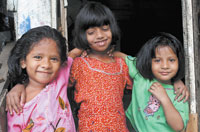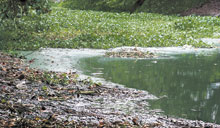| Plus |
|
|||
|
Drowning
in muck and poverty
It was a beautiful sight at night during the festive season. The high rises around the lake all with their Christmas lights, their reflection shimmering in the still waters. Early in the morning we see the pelicans on the Beira, the beautiful man-made lake which is one of Colombo’s landmarks. In the vicinity is the meditation house of the Gangaramaya temple. Adding to the picturesque scene is the newly made recreational park in the middle of the lake which speaks volumes for the efforts made by the authorities to keep the city of Colombo clean and beautiful and provide recreation areas for both locals as well as foreigners.
But
that’s just one side of the picture. Visit the shanty settlements
on the far end of the Beira Lake and you will wonder where all that
beauty has gone. The rear half of the Beira Lake, across the railtrack
by the side of the Kompanna Veediya railway station is the slum
dwellers’ territory. And it is an eyesore. The shanty community living on the lake’s edge has struggled, generation after generation amidst squalid conditions, wondering when their situation will improve. They have no option but to live here, breathing in the polluted air at this end of the lake. Why don’t they move to a better place? They are poor and have no money to make a change. In this watte is a total of about 150 little houses out of which 50 are wooden homes and the rest two-roomed units made of cement. There are about 1000 people living in this community and though they belong to different nationalities and religions, they live in harmony, the way they have been living for generations. “There are only about 10 families who are new to this watte as they are occupying rented houses. The rest of us have been living in this area for many years. But all of us are united as one family and we celebrate and participate in all the festivals be it Avurudhu, Vesak, Christmas or Ramazan. At times people have small arguments but they forget all that the next moment,” says Mangalika Bast who was among the little knot of women clustered around the public tap. “There are no robberies or other incidents of violence here although people are poor. We all try to earn a living by doing various odd jobs. Some people collect the cardboard and other pickings from the garbage dumps, some sell timber and kerosene to homes close by while others are labourers who work in the town. There are those who drive three-wheelers as well. But in general all of us are poor,” she went on. The mosquito menace is the biggest problem they face, the slum dwellers lament. “To whom can we complain when those so-called officials never turn up? Every day we see ministers passing this way in their tinted-glass vehicles but even they are not aware of our problems. We clean this lake at our own expense from time to time, but we cannot afford to do that everyday as we are just poor people,” the agitated residents tell us. The water is murky on this side of the lake. While the authorities claim that slum dwellers dump garbage into the lake, the residents deny the allegations saying that numerous illegal drains connected to the lake from different commercial organizations are the key offenders. They claim that during the recent development activities, the flow of water was blocked near the bridge to prevent contaminated water going to the front half of the lake. Due to this all the waste and muck collect in the waters near their homes. The stench is unbearable on a hot sunny day. Things are worse when it rains, they chorus. But some who have lived in this area all their life say they have grown immune to the stench. “Sometimes the Municipality workers come to spray the mosquitoes, but it has no effect as the problem eases only for a short while. Recently they came to spray chemicals to kill the weeds but after that they didn’t come to clean up the dead weeds. That is why we get this unbearable stench,” a slum dweller, Ummuhaba Badurdeen lamented. In a corner remains a row of common toilets made by the government which is being cleaned by the community on roster. “We have enough water here but no electricity for the wooden houses. The toilets are unclean because they are old and need to be renovated. How can our kids use them when the water keeps overflowing from them? During election time we get lots of visitors who go from house to house listening to our pleas. They make lots of promises but they are never kept,” she complained. Various reptiles too are found in the stagnant waters. “More than us adults, our kids have become the victims; they play close to this dangerous lake as they try to catch fish and their bodies are full of mosquito bites,” this mother laments. Residents are upset that nothing has been done by the government to improve their living conditions. “We have requested a playground and a library but to date we haven’t got them. There’s been no action even to renovate these dirty toilets which are a health hazard,” says Ummu Rafeela. She is joined by Imran who says that he is happy to see that at least the road which leads to the watte is being developed after 30 years. Asked if they would like to be re-located they express reluctance. “Our children go to the nearby schools and if we move somewhere else it would affect their education. We send them to school regularly even with much difficulty as we want them to be educated so that they will have a better future than us,” Ummu Rafeela says. Can they hope their situation will change in 2006? All
will be well soon says UDA They have a programme to relocate the slum dwellers to Dematagoda in the near future, he adds. Asked about the illegal water outlets connected to the lake, Mr. Dayananda said there are many such drains that flow directly into the lake. “We have disconnected some of them but there are so many yet to be closed. However, apart from these water outlets there are thousands of squatters who release garbage into the lake as a result of which the lake gets polluted,” he said. Asked if part of the lake is being blocked near the bridge to prevent the flow of polluted water into the Gangaramaya side of the lake which underwent a facelift recently, the official confirms that they have put ‘sand bags’ near the bridge. Colombo Municipal Council (CMC) Deputy Mayor Azath Sally said the CMC carries out day-to-day cleaning activities. “Yet if there are any complaints by the people I will definitely look into the matter,” he added. |
||||
Copyright © 2001 Wijeya Newspapers
Ltd. All rights reserved. |

